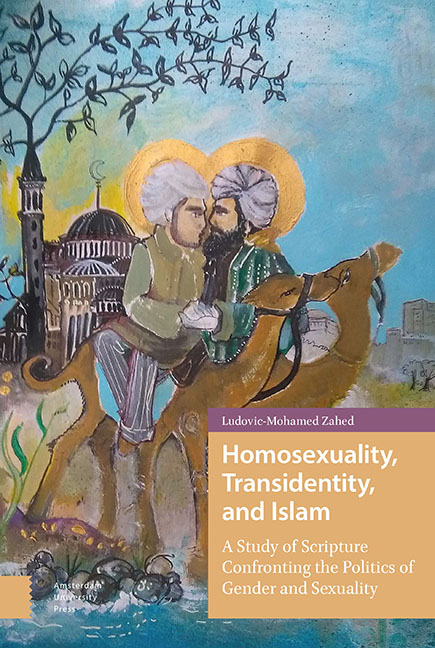 Homosexuality, Transidentity, and Islam
Homosexuality, Transidentity, and Islam Book contents
- Frontmatter
- Contents
- List of Figures
- Acknowledgments
- Foreword
- Introduction
- I The Qur’anic Ethics of “Nature”: Gender, Sexuality, and Diversity
- II Distressing Qur’anic Verses?
- III The Prophet: A Living Incarnation of Qur’anic Ethics
- IV Islamic Apocrypha Advocating the Stoning of “Sodomites”
- V Postcolonial Orientalisms
- VI “Abnormals”: From Cultural Diversity to Dogmatic Uniformity
- VII Towards a Structural Reevaluation of Cultural Values
- VIII Pan-Arabist Literary and Identity Censorship
- IX Orientalist Shi’ism and Literary Homoeroticism
- X Homonationalism and Performative Sexual Categorization
- XI A “Crisis” of Categories, Geopolitics or Civilization
- Conclusion
- Afterword
- Bibliography
- Index
XI - A “Crisis” of Categories, Geopolitics orCivilization
Published online by Cambridge University Press: 20 November 2020
- Frontmatter
- Contents
- List of Figures
- Acknowledgments
- Foreword
- Introduction
- I The Qur’anic Ethics of “Nature”: Gender, Sexuality, and Diversity
- II Distressing Qur’anic Verses?
- III The Prophet: A Living Incarnation of Qur’anic Ethics
- IV Islamic Apocrypha Advocating the Stoning of “Sodomites”
- V Postcolonial Orientalisms
- VI “Abnormals”: From Cultural Diversity to Dogmatic Uniformity
- VII Towards a Structural Reevaluation of Cultural Values
- VIII Pan-Arabist Literary and Identity Censorship
- IX Orientalist Shi’ism and Literary Homoeroticism
- X Homonationalism and Performative Sexual Categorization
- XI A “Crisis” of Categories, Geopolitics or Civilization
- Conclusion
- Afterword
- Bibliography
- Index
Summary
Abstract
This chapter presents findings that reinforce theidea that identity categories linked to gendersand sexualities we now call non-normative (withina patriarchal and natalist system) have existedsince at least the Middle Ages within Arab-Muslimsocieties, before then appearing in Europe and theWest through literary hybridizations andcross-fertilizations.
Keywords: identity categories,amnesia, geopolitics, global civilization
What pragmatic approaches do queer Muslims adopt inorder to survive and take part in social life? Formany, the question is not to determine if theirsexuality is “natural” or if the very category oftheir sexuality is “authentic.” Their problem liesin how to live out their sexual and genderidentities, their individuality, within theirfamilies and communities in a potentially hostilepublic space. For a long time, it was traditionallyrecognized as an established historical fact,following Everett Rowson or Arno Schmitt, that themain sexual distinction in the Arab-Muslim world,between men who have sex with men, was between 1)actives, generally classified as luti and 2) passives,generally classified as mukhannathun, ma’bun, or ‘ilq (the last two terms being generallypejorative), ‘amradmu’ajir (passive prostitutes), or wasi’ (an even morepejorative term). The Urdu term amrad parasti (lover of male youths) wasalso used to identify men who had an inclination forboys and young men.
When it came to women, “lesbians” were referred to assihaqat or mutathakirat. In some Asiancultures, especially in medieval Urdu Poetry, theterm chapti (clingingor sticking together) referred to sex between womenand to the women themselves (Vanita, 2001, p. xxi).Before the modern era, medieval writers like Ahmadal-Tifashi considered these women as belonging to aparticular category. This is what Dakhlia (2007)describes as a “withdrawal [repli] into a specific category.” Thisform of categorization of hybrid identity strategiesis also found in more relatively recent authors suchas Leo Africanus, in the sixteenth century. BornHassan al-Wazzan at the end of the fifteenth centuryin Muslim Andalusia, Leo Africanus highlightsseveral commonplace questions regarding the femininehomosexuality of the time: Is it frustration? Animitation of men? A challenge to male authority?
- Type
- Chapter
- Information
- Homosexuality, Transidentity, and IslamA Study of Scripture Confronting the Politics of Gender and Sexuality, pp. 101 - 106Publisher: Amsterdam University PressPrint publication year: 2019


